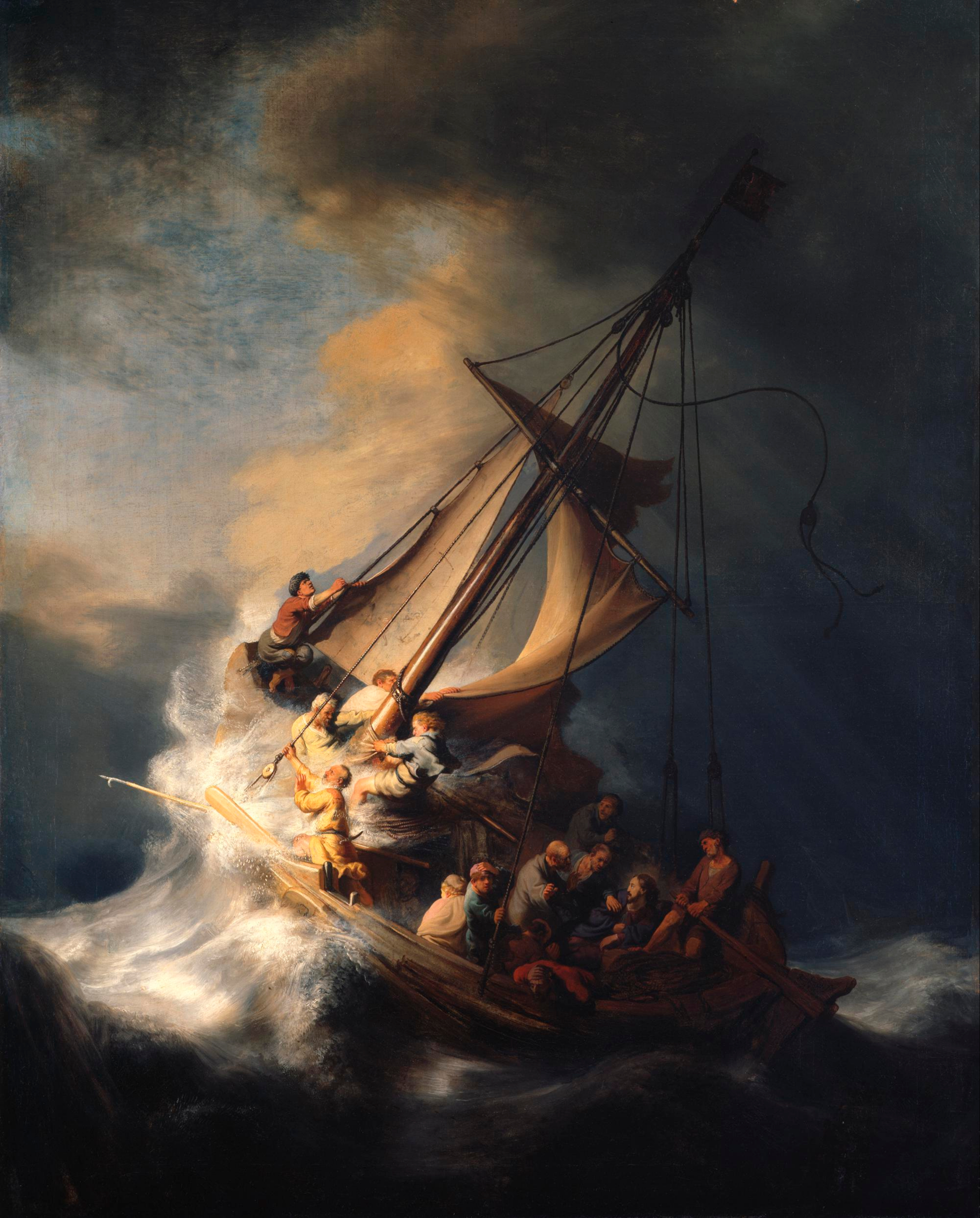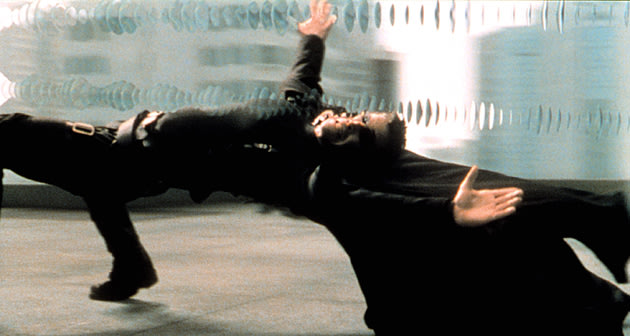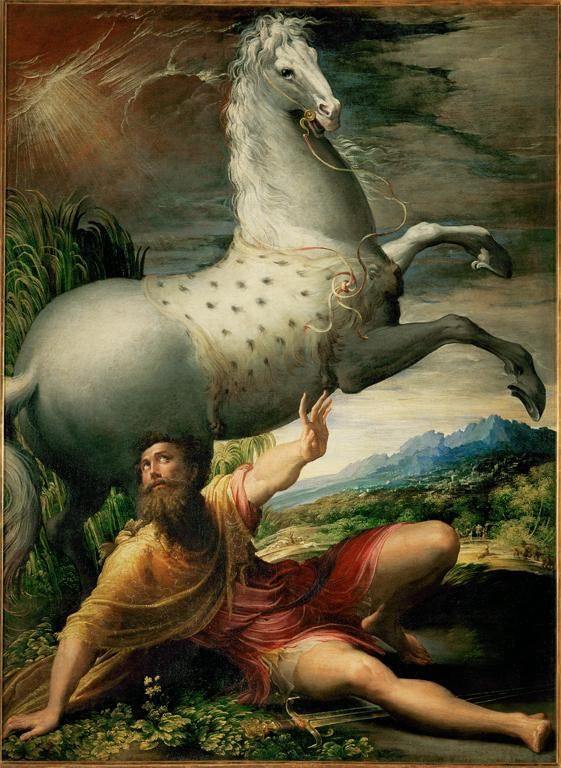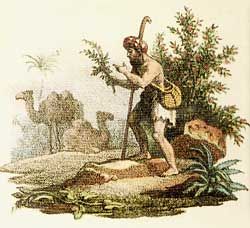If I began a sentence with "I was listening to some Christian rock and...," most people have one of two reactions. If you're one of those people that would get really excited and eager to talk about your favorite Reliant K song, I'm sorry to say I'm going to disappoint you with this post. On the other hand, if you're one of those people who says that Christian rock is for uncool, churchy kids, then I'm going to surprise you by revealing that some of the most Christian music I have ever heard is actually from a popular band.
 |
| "Jacob Wrestling with the Angel" by Rembrandt |
My primary criticism of much of the popular Christian music that I've heard is that it lacks the human element. Personally, I find much of it nauseatingly upbeat and predictably appealing to my feelings (if I had any). As a result, much of it fails to wrestle with faith, as Jacob wrestled with the angel. For this generation, faith doesn't come easy, and I think it doesn't come easy for anyone. There are far too many challenges to it for it to be simply a walk in the park. Personally for me, it's a regular struggle to push past my own rational outlook on the world and seek to understand the Divine Being who is the source of all good. Therefore, simply praising and worshiping is not something I completely "get".
Whether you have this same conflict as I do or not, everyone has their own reasons to struggle with faith. It might not be perpetual, though. Often times, it's a thing that works in a cycle: you find an inspiration to your faith, you cultivate and treasure it. Then, when you're feeling strong on your feet, you forget what go you there, which is why you fall flat on your face soon after. But ultimately, the true Christian will arise once more and fight his way back to faith and this time, in an effort to keep it.
Therefore, the Christian rock that is going to popularly engage this generation of people is going to appeal to this seemingly contradictory notion of zealously high aspirations for our faith, frustration and anxiety at our repeated failures, and a committed conversion back to our faith in God. The band I have in mind, then, is none other than Mumford & Sons, and more specifically, their album, "Sigh No More".
The album contains more Christian themes than I myself understand, and yet it maintains a firm grounding in the human person, with all of our struggles and trials. Anyone who is truly a Christian knows that it takes hard work to be one. If you don't feel like your sweating blood sometimes, just to keep your faith, then I would say you're not a Christian: your faith is not being tested, you are not truly following the path of Christ in suffering and sorrow. It is a constant struggle, one in which we occasionally, or even frequently fail to meet. But the hallmark of such an epic fight for our souls is to dust off and try again.
It all begins with the statement: "Serve God, love me, and mend". (Sigh No More) Service to God, love others, and then take care of yourself. This, of course, is none other than the Golden Rule, learned from Jesus Christ. Our lives belong to God and it is through our interaction with others that we can show our affection for God, by keeping his commandment first with the people around us and then with ourselves. The song continues with a statement so hopeful, I must reproduce it here in its entirety:
Whether you have this same conflict as I do or not, everyone has their own reasons to struggle with faith. It might not be perpetual, though. Often times, it's a thing that works in a cycle: you find an inspiration to your faith, you cultivate and treasure it. Then, when you're feeling strong on your feet, you forget what go you there, which is why you fall flat on your face soon after. But ultimately, the true Christian will arise once more and fight his way back to faith and this time, in an effort to keep it.
Therefore, the Christian rock that is going to popularly engage this generation of people is going to appeal to this seemingly contradictory notion of zealously high aspirations for our faith, frustration and anxiety at our repeated failures, and a committed conversion back to our faith in God. The band I have in mind, then, is none other than Mumford & Sons, and more specifically, their album, "Sigh No More".
 |
| Mumford & Sons |
Love; it will not betray youFirst, Love is what sets us free, and as God is caritas, the highest, ultimate form of love, that voluntary servitude towards God and others will paradoxically give us freedom, not take it away. It is in this choice of service that we demonstrate that we are free to do so. The third line suggests that to love like this is Man's true purpose, which is confirmed in the second song of the album, The Cave. The desire for freedom is once more urgently desired, "Cause I need freedom now, and I need to know how, to live my life as it's meant to be." (The Cave) The imagery of the song makes unmistakeable references to Homer's The Odyssey, in which the homeward hero, Odysseus, instructs his crew to tie him to the mast of the ship as they passed by the island of the deadly Sirens, temptresses of the sea who draw sailors to their deaths on the rocky island shores. The song draws on this desire to resist their temptuous call, even taunting the sirens with the lines, "The harvest left no food for you to eat. You cannibal, you meat-eater, you see, but I have seen the same, I know the shame in your defeat," (The Cave) for it was believed that the Sirens were cannibalistic. The third song of "Sigh No More", Winter Winds, speaks further of this same hope, reminding us that "remember spring swaps snow for leaves, you'll be happy and wholesome again, when the city clears and sun ascends." (Winter Winds) Hope that is a sure mark of the Christian, for while the rest of the world despairs in its damnation, this soul understands that he was made to be united with God and He will deliver him.
Dismay or enslave you, it will set you free
Be more like the man you were made to be
 |
| Ulysses and the Sirens by John William Waterhouse |
However, pride, doubt, and rebellion begins to creep in. Despite the obviously Christian references of Roll Away the Stone, it is not a positive song towards faith. In fact, it is contemptuous and bitter towards God: "It seems that all my bridges have been burnt, but you say that's exactly how this grace thing works." (Roll Away the Stone) To be honest, I sympathize with the verses of this song because faith often results in the free choice of the Creation against the Creator. It is certainly not Man's purpose to do this, as we have seen, but we do it anyway because our created natures "know better" than the omnipotent nature: "But you, you've gone too far this time, you have neither reason nor rhyme, with which to take this soul that is so rightfully mine." (Roll Away the Stone)
My interpretation of White Blank Page, the fifth song on the album, presumes to put words in the mouth of God, as I believe he reacts to this rebellion. The opening verses of the song question Man's desires and probes his very soul for fittingness:Can you lie next to her
And give her your heart, your heart
As well as your body
And can you lie next to her
And confess your love, your love
As well as your folly
And can you kneel before the King
And say I'm clean, I'm clean
To me, this echoes a soul's Examination of Conscience, in which the Christian surveys their words, thoughts, and actions for any sins committed for which reparations need to be made. It is true, a man in rebellion against God cannot answer these and still claim to be His servant. However, it is with great sadness that the words mournfully carry on, "But tell me now, where was my fault, in loving you with my whole heart." (White Blank Page) Who can claim no fault or harm towards us and also have loved us with His whole heart? My guess is Jesus Christ.
The human soul is now steeped in bitterness towards his Creator. He has forsaken Him and has turned towards his own passions, "Stars hide your fires, these here are my desires, and I won't give them up to you this time around." (Roll Away the Stone) But it is in I Gave You All that Man must express his unmistakeably anguish at having been separated from God.The lost and wayward soul has given his God everything he has, and yet "... you rip it from my hands, and you swear it's all gone. And you rip out all I have, just to say that you've won," like a small child who takes what is not his and hides it behind his back, claiming complete ignorance of the wrong. |
| Devils from a fresco in the Rila Monestary in Bulgaria |
Now, the devil has his prize. Man has forsaken God for his own passions, and now Satan claims what is his. He taunts Man, "Weep for yourself, my man, you'll never be what is in your heart. Weep, little lion man, you're not as brave as you were at the start." (Little Lion Man) This hits very close to home for me and for anyone who recognizes, despite their best intentions, there is always that evil voice, whispering in your ear and telling you about all the things you could never do because you lack the strength and courage to do them. This song is by far the most angsty and frustrated of the entire album. Even the chord progression sounds like a demon's jig over his winnings. The devil gloats to us that despite all our strength, all our virtue, we are still subject to his power and "your grace is wasted in your face, your boldness stands alone among the wreck." (Little Lion Man) In fear is the way the devil likes to keep Man, and it is in our fears that Satan reigns supreme.
If Little Lion Man is Satan's triumphant jeering, then Timshel, the proceeding song, is God's invitation to return to His grace. Upon seeing the peculiar title of the song, I was immediately curious about what it meant. As it turns out, timshel is commonly understood to be Hebrew for "thou shalt", as it is found in the Ten Commandments. However, in John Steinbeck's book East of Eden, two characters have a discussion of its meaning, and one of them reveals that it's original meaning has been confused and that it actually means "thou mayest". He claims that the "mayest" distinguishes itself from "shalt" because it puts emphasis on Man's freedom to choose, and not on the deterministic and inevitable implications of "shalt". Mumford & Sons makes this a critical, tender moment after the previous harsh, and at times vulgar tune of Little Lion Man. The soul now realizes that despite his despair, "you have your choices, and these are what make man great, his ladder to the stars." (Timeshel) Man's freedom is what makes him like God, in his image and likeness. God does not leave Man to these choices, alone and unaided: "you are not alone in this, as brothers we will stand and we'll hold your hand." (Timshel) However as the song ends, the final haunting words, "But I can't move the mountains for you" (Timshel) put the ultimate responsibility on Man to make the right choices. God's grace is sufficient to do anything, and He gives it to us all time, but if we are not willing to to do the will of God, His grace will fall on fallow ground or choked by thorns. (Luke 8:4-15)
Thorns, or Thistles and Weeds, which coincidentally enough, is the title of the next song, rise up and choke our faith in Christ's Parable of the Sower. The lyrics tell us to "plant your hope with good seeds, don't cover yourself with thistle and weeds, rain down, rain down on me." (Thistles and Weeds) In keeping with the Parable of the Sower, the teachings of Christ are the good seeds we should seek to plant within us, and those of the world only yield destructive fruits. The song creates an air of impending doom, as if the vices of this world threaten to strangle any faith that we have.
 |
| Landscape with the Parable of the Sower by Pieter Bruegel the Elder |
Threatened by this evil, Man cries out to be free of these vicious habits and temptations. Our souls were made for higher things, but when our back have been turned to God's graces, these higher things are impossible to realize. Very soon, a soul must admit that he's been wrong, that "now my heart stumbles on things I don't know, my weakness I feel I must finally show." (Awake My Soul) That 'weakness' of dependence on God is a lie from the devil. Of course, we are weak, but the notion that we are autonomous, that we have no dependence on anything is a clever deception of the devil to take advantage of our pride: "How fickle my heart and how woozy my eyes, I struggle to find any truth in your lies." (Awake My Soul) But Man knows in the depths of his heart that he is dependent and that he cannot live without a higher Helper. The Helper, which is a term used by Christ in reference to Holy Spirit, offers to us, "Lend me your hand and we'll conquer them all, but lend me your heart and I'll just let you fall. Lend me your eyes I can change what you see, but your soul you must keep, totally free." (Awake My Soul) God permits us to keep our souls and our freedom. He does not take that timshel away, but gives us that responsibility to make those choices. He allows us to fall sometimes because that is how we realize our dependence on our Creator, "For you were made to meet your maker." (Awake My Soul)
The eleventh song on the album, Dust Bowl Dance, deviates strangely from the rather abstract, introspective tone of the rest of the album. It tells the story of a young man whose farm is being foreclosed upon after a recent famine. The young man's anger and bitter frustration with those who would take his land is frighteningly apparent with, "I'll go out back and I'll get my gun, I'll say, 'You haven't met me, I am the only son.'" (Dust Bowl Dance) However, this song is retrospective because the crime has already been committed, "Well, yes sir, yes sir, yes, it was me, I know what I've done, 'cause I know what I've seen." (Dust Bowl Dance) After the evil Man does in a moment of passionate rage, the soul feels the crushing weight of its sins and the feeling is one of intense contrition, "So collect your courage and collect your horse, and pray you never feel this same kind of remorse." (Dust Bowl Dance) And this is how we reapproach our God who we have denied: with sorrow and true contrition for our sins. The soul, having made this painful journey illustrated in each chapter of this album, now looks to return to God and seek his forgiveness.
 |
| The Storm on the Sea of Galilee by Rembrandt |
It is fitting then, that final song of the "Sigh No More", After the Storm, draws on some imagery from the Parable of the Prodigal Son. After his defiance to God, after his bitter rebellion against his Creator, Man's pride fails him and he cannot run anymore, "And after the storm, I run and run as the rains come and I look up, I look up, on my knees and out of luck, I look up." (After the Storm) His soul is weary of his insurgency against the Lord, for he has found the bottom of the pit which he himself has dug. He sees the meaninglessness of his own acts, but still desires to not waste away, "But I won't rot, I won't rot, not this mind and not this heart, I won't rot." (After the Storm) Now, the soul must return to his God. His loneliness in his appalling state has shown him that God is the only one who can welcome him back: "And I won't die alone and be left there. Well I guess I'll just go home, Oh God knows where." (After the Storm) Though his sorrow for his own sins makes him realize the grave injustice that he has done to his Maker, it does not stifle all his hope. With God, there is a better life, and these verses make that abundantly clear:
And there will come a time, you'll see, with no more tears.
And love will not break your heart, but dismiss your fears.
Get over your hill and see what you find there,
With grace in your heart and flowers in your hair.
And with that, Sigh No More reaches it's conclusion, and the Christian begins once more in his quest for unity with God. So am I totally full of it? Am I just making this up and really this album is another rant meant to fulfill any lingering teenage angst? Maybe, but as far as I'm concerned, this is the most Christian rock album I've ever heard.






.jpg)

.jpg)


